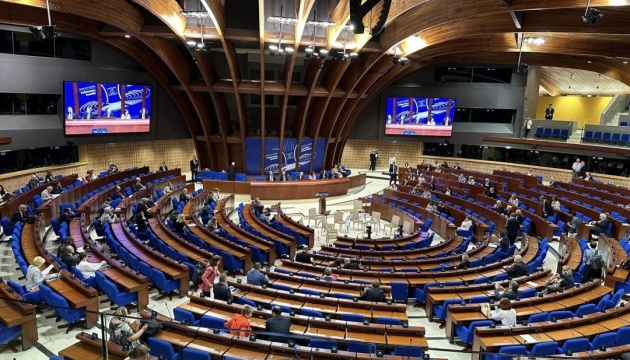
The Parliamentary Assembly of the Council of Europe (PACE) will consider a proposal on Monday, April 7, to hold urgent debates on ensuring Russia is held accountable for the crime of aggression.
Mariia Mezentseva, head of the Permanent Delegation of Ukraine’s Verkhovna Rada to PACE, said this in comments to Ukrinform.
“We believe the central topic of PACE’s April session should be the urgent debate initiated by our Romanian colleague, Iulian Bulai, Chair of the ALDE political group. At a meeting of the conciliatory council, he raised a critically important issue — the inevitability of accountability for Russia’s crime of aggression against Ukraine,” Mezentseva said.
She noted that it would become clear on Monday whether the debate would be held and a corresponding resolution adopted, once the agenda of the spring session — running from April 7 to 11 –is approved by the assembly.
According to the PACE website, urgent debates are also proposed on the situation in Georgia, the challenge of the credentials of the Georgian parliamentary delegation, the arrest of the Mayor of Istanbul, and the humanitarian blockade of Gaza.
“We strongly hope that the resolution on ensuring accountability for Russia’s crime of aggression will be approved for consideration, but this will be confirmed on Monday at the opening of the session, as it is competing with four other topics,” Mezentseva added.
She said that in the context of holding Russia accountable for its crime of aggression against Ukraine, it is crucial to agree on a plan for the establishment of a Special Tribunal for the Crime of Aggression.
“You may know that a final meeting recently took place among countries supporting the tribunal — over 40 nations, including the entire EU — and we are expecting more countries to join. We are eager to see the final documents drafted by the working group, including the statute and rules of procedure, which will define how Russia’s top political and military leadership — around 20 individuals — could be brought to justice,” Mezentseva said.
She stressed that the creation of the Special Tribunal for the Crime of Aggression does not exclude the work of the International Criminal Court, which has already issued two arrest warrants — for Vladimir Putin and Maria Lvova-Belova.
Mezentseva noted that during the debate and consideration of the resolution regarding accountability for Russia’s crimes, the operation of the international compensation mechanism — the Register of Damage — would also be discussed.
“We have opened offices together with the Register Council in The Hague and in Kyiv. Moreover, six new categories have been added to the Register (internal displacement; serious bodily injury; sexual violence; torture; unlawful detention (captivity); and forced labor or service). Applications can now be submitted through the ‘Diia’ app. This brings the total number of open claim categories to nine. The historical importance of the Register of Damage lies in the fact that, for the first time, non-material losses will also be considered for compensation. As for its financial backing, we are continuing to work on this and hope that Russian assets will be used for the purpose,” Mezentseva said.
She added that more than 20,000 claims have already been submitted to the international Register of Damage via the Diia app.
“We encourage everyone to apply. You can do so regardless of whether you have already received compensation from the Ukrainian state. It is also possible to apply under multiple categories at once — for example, having a relative in captivity and also loss of property. These categories are not mutually exclusive,” she said.
The PACE’s spring session will also feature an art exhibition dedicated to Ukrainian cities destroyed by the Russian army. Additionally, a special event will be held to address the issue of returning abducted Ukrainian children.
On February 4, legal experts from the European Commission, Council of Europe, Ukraine, and 37 other countries presented the first draft statute of the international Special Tribunal on the Crime of Aggression against Ukraine, following work by the core expert group in Brussels.
Ukraine’s Permanent Representative to the Council of Europe, Borys Tarasyuk, has predicted that the vote on a joint agreement between Ukraine and the Council of Europe — which will form the basis for the Special Tribunal — and the establishment of the tribunal itself will likely take place in May 2025.
Source: Mezentseva: Key event at PACE should be debate on holding Russia accountable for crime of aggression



